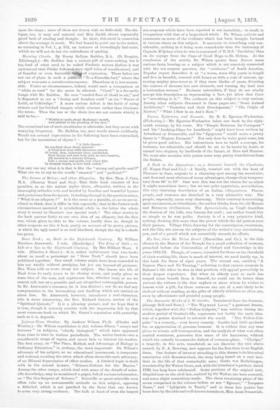Morning Clouds, By Henry Bellyse Baildon, B.A. (D. Douglas, Edinburgh.)—Mr.
Baildon has a certain gift of verse.writing, but is too fond of what used to be called Pindaric metres (before it was understood that Pinder followade? ry rigid rules of versification), and
of fanciful or even fantastic of expression. These latter arc not out of place in such a peke "To a Camellia-bud," where the subject warrants a certain extravagance. Elsewhere it is less season- able. Under no circnmstances, indeed, would such a comparison as "white as curd" for the moon be allowed. " Curd " is a favourite image with Mr. Baildon. He sees " curded floes of cloud in air," and is disgusted to see a "frothy and feculent curd" on the "Water of Leith, at Coltbridge." A more serious defect is the habit of using remote and far-fetched images, which obscure rather than illustrate the sense. Thus the sea or the shore (we are not certain which) is said to be,— "Wistful ns smile about Madonna's mouth, ' And patient BB the pleading of her eyes,"
The occasional use of such similitudes is allowable, but they occur with wearying frequency. Mr. Baiklon, too, uses words almost recklessly. Would not several expressions in the following have been retrenched, but for the necessities of rhyme F-
• " A little thence— Its crackled silver dimly guessed—
A birch-tree rises with strenuous swerve Of trunk, firm, balancing clear, unblended, Each bough and each twig with its sure reourve,
All meshed to a tracery delicate.
Like a strong and gentle seal whose fate In struggle begun, in love bath ended."
Can any one say what it is that is like the "strong and gentle soul P" What are we to say to the words " sneered " and " godhood ?"


































 Previous page
Previous page